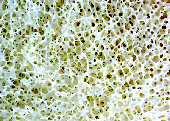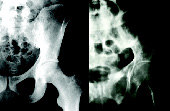Researchers have high hopes from Vitamin D, which comes from our skin’s reaction to sunlight, a few foods, and supplements. Vitamin D of course helps build strong bones, but does Vitamin D offer protection against Diabetes, Multiple Sclerosis, cancer, heart disease and depression, or help you lose weight – as some espouse?
Vitamin D is critical for strong bones - from infancy to old age. It helps the body absorb calcium from food. Children need ‘D’ to build strong bones and prevent rickets, which causes bowed legs and knock knees. Adults need a daily dose of ‘D’ and calcium to prevent fractures and brittle bones.

The 'honeycomb' structure inside a healthy bone.
Most people get some Vitamin D from sunlight. When the sun shines on your bare skin, your body makes its own Vitamin D. But you probably need more than that. Fair-skinned people might get enough in 5-10 minutes on a sunny day, over a a few days a week. But cloudy days, the low light of winter and the use of sun block (important to avoid skin cancer and skin ageing) interfere with the ‘production’ of Vitamin D. Older people and those with darker skin tones don’t ‘make’ as much Vitamin D from exposure to the sun. Experts state that it’s better to rely on the appropriate food and supplements. Many of the foods we eat have no naturally occurring Vitamin D. Fish such as salmon, swordfish or mackerel are exceptions, and can provide a healthy amount of Vitamin D in one serving. Other fatty fish such as tuna and sardines have some ‘D’, but in much lower amounts. Small amounts of Vitamin D are found in egg yolk, beef liver and fortified foods like cereal and milk. Cheese and ice cream do not usually have added Vitamin D. If you choose your breakfast foods wisely, you can get a substantial amount of Vitamin D. Most types of milk are fortified, including some soy milks. Orange juice, cereal, bread and some yogurt brands also commonly have added Vitamin D. Check the labels to see how much ‘D’ you’re getting. Eating Vitamin D-rich foods is the best way to get ‘D’. However, if you still need help getting enough, there are two kinds of supplements: D2 (ergocalciferol), which is the type found in food; and D3 (cholecalciferol), which is the type ‘made’ from sunlight. They’re produced differently, but both can raise Vitamin D levels in your blood. Most multivitamins have 400 IU of Vitamin D. Check with your health care provider for the best supplements for your needs.

Are You Vitamin D deficient?
If you have problems in ‘adequately’ converting Vitamin D from food or sunshine, you run the risk of a deficiency. Factors that increase your risk include:
- Being age 50 or older
- Having a dark skin
- Residing in the North
- Being overweight/obese
- Having undergone gastric bypass surgery
- An allergy to milk or lactose intolerance
- Suffering from liver or digestive diseases, such as Crohn’s disease or celiac
Symptoms of 'D' Deficiency
Most people with low levels of Vitamin D in the blood don’t notice any symptoms. A severe deficiency in adults can cause ‘soft bones’, called osteomalacia (shown here). The symptoms include bone pain and muscle weakness. In children, a severe deficiency can lead to rickets and symptoms of soft bones and skeletal problems.
Testing your Vitamin D Level
A simple blood test, called the 25-hydroxyvitamin D test, can check your Vitamin D level. Current guidelines by the Institute of Medicine set a Vitamon D blood level of 20 nanograms per milliliter (ng/mL) as a goal for good bone health and overall health. However, some doctors say that people should have a level of about 30 ng/mL, in order to realise the full health benefits from Vitamin D.
How much Vitamin D do you need?
The recommended dietary allowance for Vitamin D is 600 IU (International Units) per day for adults up to the age of 70. People older than that should aim for 800 IU from their diet. Some researchers recommend much higher doses of Vitamin D, but too much can hurt you. At above 4,000 IU per day, there is a serious risk of you being harmed.
Daily ëDí for babies & children
Breast milk is best, but it doesn’t have much of Vitamin D. Breast-fed babies need 400 IU of Vitamin D until they’re weaned to a fortified formula and can drink at least one litre (about 4 ¼ cups) every day. High doses to babies can cause nausea, vomiting, loss of appetite, excessive thirst and muscle aches - or even more serious symptoms. Most children and adolescents don’t get enough Vitamin D from milk. They should have a supplement that provides 400 IU to 600 IU; this amount is often included in chewable multivitamins. Children with some chronic diseases such as cystic fibrosis may be at an increased risk of Vitamin D deficiency. Talk to your child’s doctor about the need for extra Vitamin D.
How much Is too much?
Some researchers suggest that you take far more Vitamin D than the 600 IU daily guideline for healthy adults. But very high doses of Vitamin D can raise your blood calcium level, causing damage to the blood vessels, heart and kidneys. The Institute of Medicine sets the upper tolerable limit at 4,000 IU of Vitamin D per day. You can’t get too much Vitamin D from the sun; your body simply stops making more. You should also realise that high sun exposure without sunscreen can raise your risk of skin cancer.
Drugs that interact with Vitamin D
Some drugs cause your body to absorb less of Vitamin D. These include laxatives, steroids, anti-seizure and anti-cholesterol medicines. If you take digoxin, a heart medicine, along with a high dose of Vitamin D, it can lead to an abnormal heart rhythm. It’s important to discuss your use of Vitamin D supplements with your doctor or pharmacist.
The jury is still out on many of the other health benefits of Vitamin D. Experts have for years suspected a link between sunlight, Vitamin D levels and the autoimmune disorder of Multiple Sclerosis (MS), which damages the nerves. However, despite encouraging new clues, there’s not enough evidence to recommend Vitamin D for the prevention or treatment of MS. Some studies have shown a link between a low Vitamin D level and Type 2 Diabetes. Again, there is not enough proof for doctors to recommend a Vitamin D supplement to prevent this disease. Other studies have shown that people who are obese often have low levels of Vitamin D - body fat traps the Vitamin D, making it less available to the body. However, it’s not clear whether obesity itself causes a low Vitamin D level, or vice versa is more applicable. A small study has shown that adding Vitamin D to a calorie-restricted diet helped overweight people who had low Vitamin D levels, to lose weight more easily. Vitamin D also plays a role in the function and development of the brain. While a promising study has shown that large doses of Vitamin D could lessen the symptoms of mild depression, some other studies have shown mixed results. It’s too soon to make a strong case for Vitamin D as an overall cancer-fighter. While newer studies suggest that people with higher levels of Vitamin D in their blood may have a lower risk for Colon Cancer, and there are even claims that Vitamin D can be helpful in preventing Breast and Prostate Cancer, researchers don’t yet have enough evidence to claim that the benefits are ‘real’. Meanwhile, a healthy body weight, regular exercise and the diet guidelines of the American Cancer Society are the best antidote for the prevention of cancer. Low levels of Vitamin D have been linked to a greater risk of heart attack, stroke and heart disease.However, it’s not clear whether boosting Vitamin D will reduce heart risks and, if so, how much Vitamin D is needed. Very high levels of Vitamin D in the blood can actually harm the blood vessels and the heart, by increasing the amount of calcium in the bloodstream.Researchers have found that older people with Vitamin D deficiency performed poorly on tests of memory, attention and reasoning, compared to those with adequate Vitamin D levels. Better studies are needed to confirm if Vitamin D supplements can prevent dementia or a slow mental decline.
Read More...